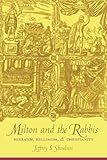Milton and the Rabbis : Hebraism, Hellenism, and Christianity / Jeffrey Shoulson.
Material type: TextPublisher: New York, NY : Columbia University Press, [2001]Copyright date: ©2001Description: 1 online resource (384 p.)Content type:
TextPublisher: New York, NY : Columbia University Press, [2001]Copyright date: ©2001Description: 1 online resource (384 p.)Content type: - 9780231123297
- 9780231506397
- Christianity and other religions -- Judaism -- History -- 17th century
- Hebrew literature -- Appreciation -- England
- Hellenism -- History -- 17th century
- Jewish learning and scholarship -- England -- History -- 17th century
- Judaism in literature
- Judaism -- Relations -- Christianity -- History -- 17th century
- LITERARY CRITICISM / European / English, Irish, Scottish, Welsh
- 821.4 821/.4
- PR3592.R4 S45
- online - DeGruyter
- Issued also in print.
| Item type | Current library | Call number | URL | Status | Notes | Barcode | |
|---|---|---|---|---|---|---|---|
 eBook
eBook
|
Biblioteca "Angelicum" Pont. Univ. S.Tommaso d'Aquino Nuvola online | online - DeGruyter (Browse shelf(Opens below)) | Online access | Not for loan (Accesso limitato) | Accesso per gli utenti autorizzati / Access for authorized users | (dgr)9780231506397 |
Browsing Biblioteca "Angelicum" Pont. Univ. S.Tommaso d'Aquino shelves, Shelving location: Nuvola online Close shelf browser (Hides shelf browser)

|

|

|

|

|

|

|
||
| online - DeGruyter A Framework for Immigration : Asians in the United States / | online - DeGruyter Boys Don't Cry? : Rethinking Narratives of Masculinity and Emotion in the U.S. / | online - DeGruyter Presidential Power : Forging the Presidency for the Twenty-First Century / | online - DeGruyter Milton and the Rabbis : Hebraism, Hellenism, and Christianity / | online - DeGruyter Covering Globalization : A Handbook for Reporters / | online - DeGruyter In Their Own Voices : Transracial Adoptees Tell Their Stories / | online - DeGruyter Torn at the Roots : The Crisis of Jewish Liberalism in Postwar America / |
Frontmatter -- Contents -- Acknowledgments -- A Note on the Texts -- Introduction: Hebraism and Literary History -- 1. Diaspora and Restoration -- 2. "Taking Sanctuary Among the Jews": Milton and the Form of Jewish Precedent -- 3. The Poetics of Accommodation: Theodicy and the Language of Kingship -- 4. Imagining Desire: Divine and Human Creativity -- 5. "So Shall the World Go On": Martyrdom, Interpretation, and History -- Epilogue: Toward Interpreting the Hebraism of Samson Agonistes -- Notes -- Selected Bibliography -- Index
restricted access online access with authorization star
http://purl.org/coar/access_right/c_16ec
Taking as its starting point the long-standing characterization of Milton as a "Hebraic" writer, Milton and the Rabbis probes the limits of the relationship between the seventeenth-century English poet and polemicist and his Jewish antecedents. Shoulson's analysis moves back and forth between Milton's writings and Jewish writings of the first five centuries of the Common Era, collectively known as midrash. In exploring the historical and literary implications of these connections, Shoulson shows how Milton's text can inform a more nuanced reading of midrash just as midrash can offer new insights into Paradise Lost.Shoulson is unconvinced of a direct link between a specific collection of rabbinic writings and Milton's works. He argues that many of Milton's poetic ideas that parallel midrash are likely to have entered Christian discourse not only through early modern Christian Hebraicists but also through Protestant writers and preachers without special knowledge of Hebrew. At the heart of Shoulson's inquiry lies a fundamental question: When is an idea, a theme, or an emphasis distinctively Judaic or Hebraic and when is it Christian? The difficulty in answering such questions reveals and highlights the fluid interaction between ostensibly Jewish, Hellenistic, and Christian modes of thought not only during the early modern period but also early in time when rabbinic Judaism and Christianity began.
Issued also in print.
Mode of access: Internet via World Wide Web.
In English.
Description based on online resource; title from PDF title page (publisher's Web site, viewed 02. Mrz 2022)


